Have you ever thought about how an office move could shake up your business—either for better or worse? It’s easy to focus on the big stuff, like packing desks and hiring movers, but what about the details that could make or break your transition? A poorly planned move can disrupt productivity, frustrate employees, and even cost you more than you expected. In fact, corporate relocations cost businesses an average of $16.2 million annually—which is why planning ahead is crucial.
Let’s go beyond the typical moving checklist and talk about the things most businesses overlook—because you don’t just want to move. You want to move well.
The Hidden Challenges of Office Relocation

Most businesses focus on logistics—finding a new space, packing up, and scheduling a moving truck. But what about the things that aren’t on your radar? A smooth office relocation isn’t just about moving desks and computers—it’s about ensuring business continuity, keeping employees engaged, and avoiding hidden costs. Let’s dive deeper into some often-overlooked challenges that could make or break your move.
Employee Productivity & Morale Can Take a Hit
An office move isn’t just a logistical change—it’s an emotional and psychological one, too. Employees who have grown comfortable in their workspace may feel anxious or uncertain about what’s ahead. Will their commute get longer? Will their seating arrangement change? Will they still have access to nearby coffee shops, gyms, or daycare services that make their routine easier?
Even before the moving trucks arrive, productivity can dip. Disruptions like packing, downsizing, and adjusting to new technology can slow down workflow. Employees may also feel disconnected if they’re not informed about the move’s progress or how it affects them personally. A survey by the International Facility Management Association (IFMA) found that poor communication during office relocations leads to lower employee satisfaction and engagement.
To keep morale high:
- Involve employees early in the process—gather feedback on what they need in the new space.
- Provide clear timelines, regular updates, and Q&A sessions to reduce uncertainty.
- Organize welcome events or office tours before the move to help employees get familiar with the new space.
A move isn’t just about changing addresses—it’s about keeping your team motivated and excited for what’s next.
Legal & Compliance Issues Might Surprise You
Imagine moving into a brand-new office space only to find out that your business isn’t legally allowed to operate there—a nightmare scenario that happens more often than you’d think. Many business owners forget to check whether their industry is permitted under local zoning laws or if they need new business permits to operate in a different city or district.
Other legal pitfalls include:
- Lease agreements – Does your new lease align with your long-term business needs? Are there hidden clauses about subleasing or maintenance responsibilities?
- Insurance policies – Some locations require different types of liability or property insurance.
- Health and safety regulations – Are there new fire codes, accessibility requirements, or occupancy limits to meet?
Failing to address these issues before moving can lead to costly fines, operational delays, or even lawsuits. Consulting a legal expert before your move can save you from these headaches.
IT and Data Security Are at Risk
Your office move isn’t just about physical assets—it’s about protecting your digital infrastructure, too. If your IT relocation isn’t carefully planned, you risk data loss, security breaches, or major downtime that can disrupt your business operations.
Some key challenges include:
- Server and network transitions – Will your current hardware work in the new space? Do you need upgraded internet connections or cabling?
- Data security – If sensitive company information isn’t securely handled during the move, it could fall into the wrong hands.
- Downtime risks – IT system failures could leave employees unable to work for days, impacting revenue and customer satisfaction.
According to a study by TechRepublic, 70% of companies experience unexpected IT issues after relocating, with 43% facing serious downtime.
To prevent this:
- Have an IT team oversee the move and conduct security risk assessments.
- Create backups of all critical data before relocating.
- Test all systems before reopening to avoid unnecessary downtime.
Moving IT infrastructure isn’t as simple as plugging things back in—without careful planning, your business could face costly disruptions.
Culture Shock is Real
Most businesses don’t think about the cultural impact of moving, but it can be a big deal. Even if you’re just relocating within the same city, different neighborhoods have different vibes, commute times, and amenities. If your employees are used to a 10-minute commute and suddenly have to drive 45 minutes, their job satisfaction could take a hit.
Bigger moves—such as relocating to a new city, state, or even country—introduce even more challenges:
- Differences in work culture – Some cities have more formal business environments, while others are more relaxed.
- Hiring and retention – Will local talent align with your company’s needs? Will existing employees move with you or leave?
- Local regulations and taxes – Business taxes, employment laws, and operating costs can vary widely between locations.
A Harvard Business Review study found that businesses relocating to new cities often underestimate the cultural and economic shifts, leading to employee turnover rates increasing by 20% within the first year.
To ease the transition:
- Offer relocation support for employees, such as transportation stipends or flexible work arrangements.
- Consider hybrid or remote work options for team members struggling with the change.
- Research the local business environment and workforce before finalizing your move.
How to Move Your Office the Right Way
Now that you know what not to overlook, let’s talk about what you should do to make this move as smooth as possible.
1. Plan Early and in Detail
Create a timeline that covers everything from choosing a new location to unpacking in your new office. Assign responsibilities to team members so nothing slips through the cracks. Having a moving plan can help you avoid costly last-minute surprises.
2. Budget for the Unexpected
Moving costs add up fast. Besides moving services, you might have expenses for renovations, equipment upgrades, or temporary workspace solutions. Make sure your budget includes a contingency fund—because unexpected costs are almost guaranteed.
3. Communicate with Your Team
Keep your employees in the loop. Share moving dates, changes in workspace layout, and how the move will affect their day-to-day. Consider holding Q&A sessions or sending regular email updates to keep everyone informed.
4. Work with a Reliable Moving Company
Not all moving companies are created equal. When it comes to commercial moves, you need a team that understands office logistics—like Aleks Moving. Their commercial moving services are designed to handle the unique challenges businesses face, from carefully transporting electronics to minimizing downtime.
5. Test IT Systems Before Moving Day
The last thing you want is to arrive at your new office and realize the internet doesn’t work or your network isn’t secure. Conduct a full test run of your IT setup before moving day to avoid delays.

Key Takeaways
- A smooth office move requires more than just hiring movers—it’s about strategic planning.
- Overlooking factors like employee morale, IT security, and legal compliance can lead to major disruptions.
- Budget wisely and plan for unexpected costs.
- Keep communication open with employees to maintain engagement.
- Partnering with an experienced mover like Aleks Moving can take the stress out of your relocation.
Thinking about an office move? Don’t leave anything to chance. A poorly executed move can cost you time, money, and productivity. Instead, get expert help from Aleks Moving—a trusted commercial moving service that ensures your transition is seamless. Their team specializes in efficient office relocations, so you can focus on what matters most—running your business. Contact Aleks Moving today to start planning a stress-free move!
Follow our social media pages below:
Find out more articles that can help you below:
IT Equipment Moving: Protecting Your Business Assets



